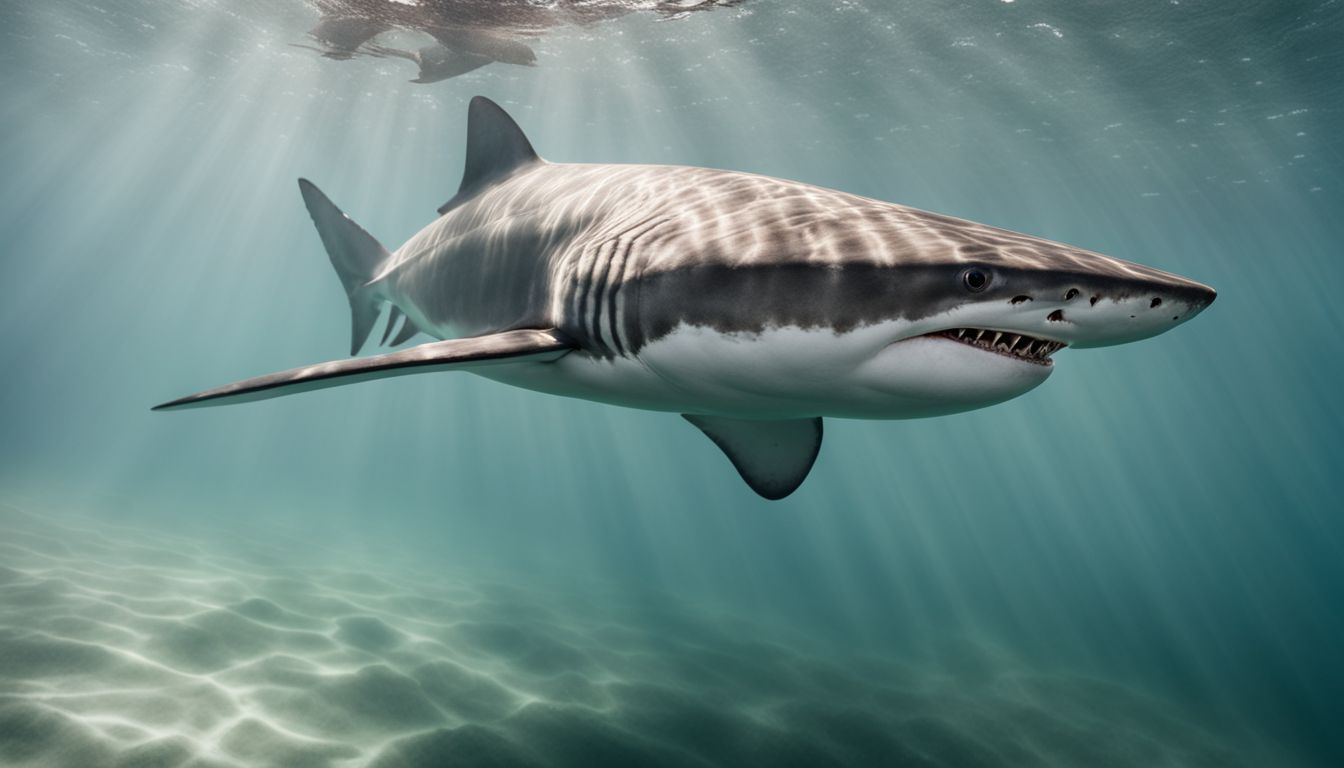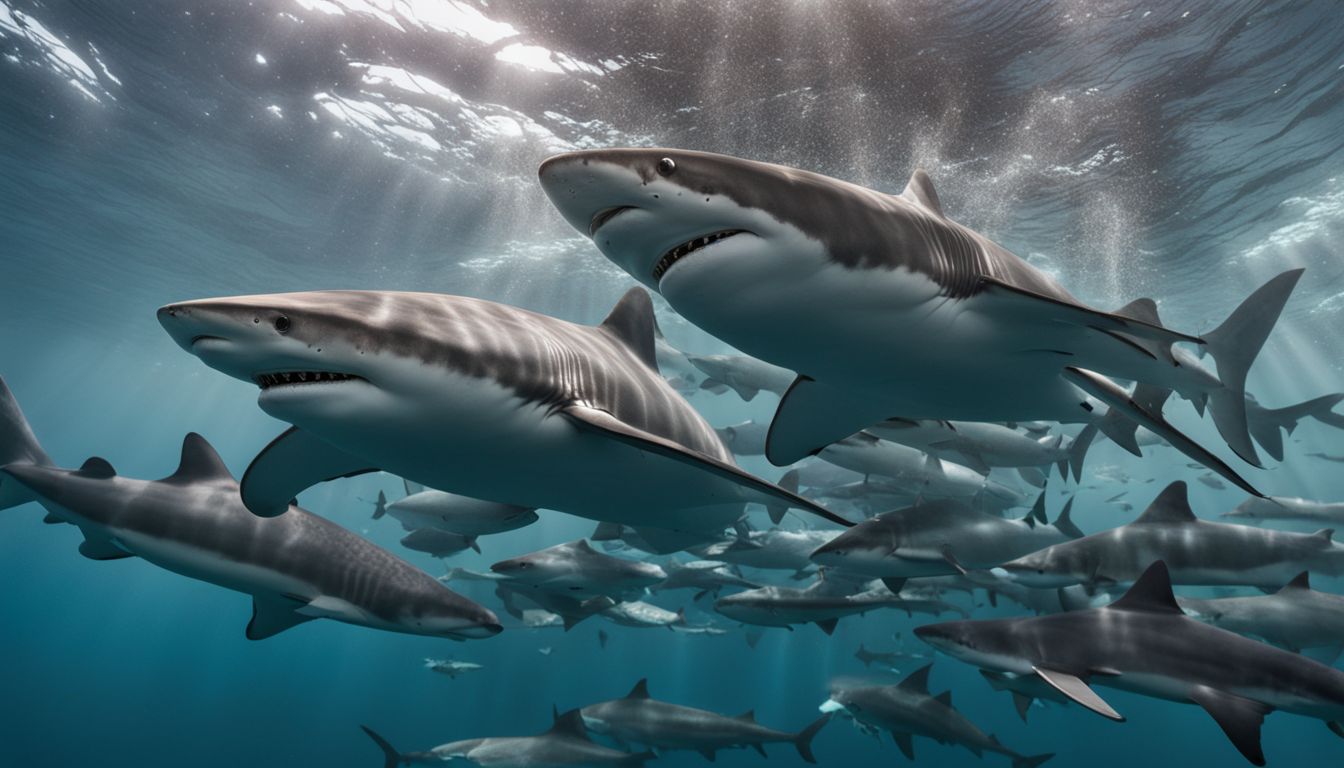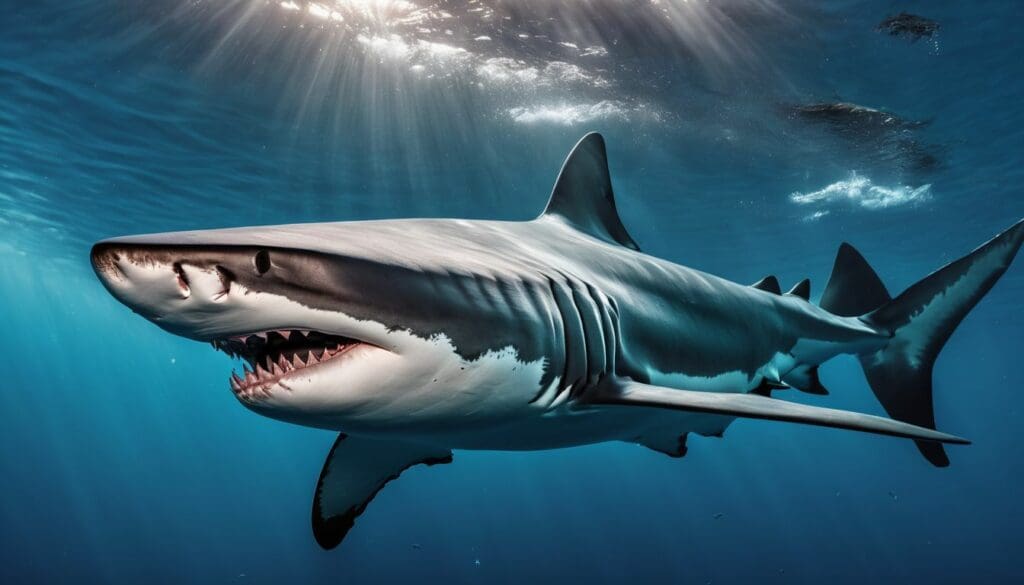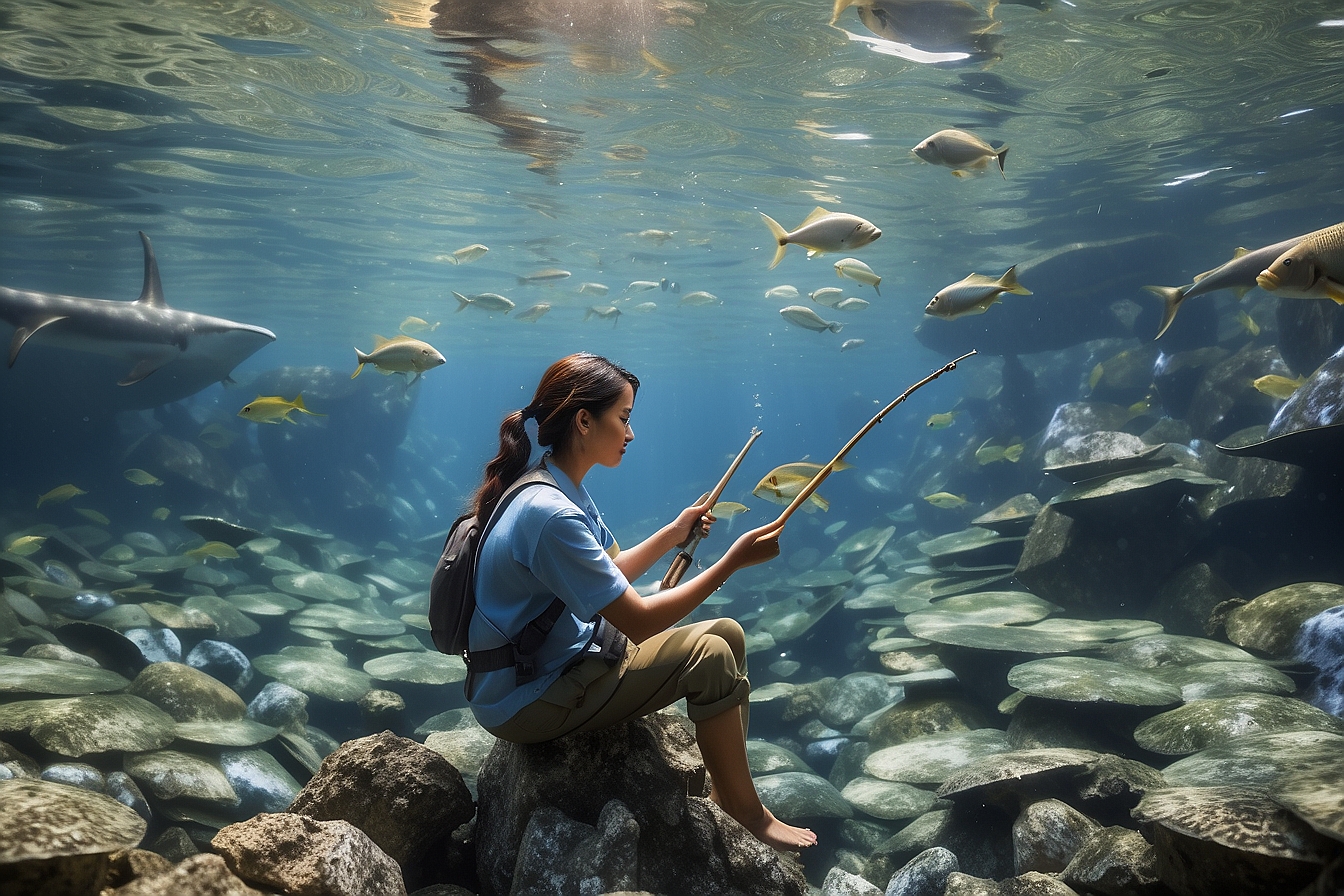Sharks often get a bad rap as the fearsome denizens of the deep. Like many folks, we’ve all heard those spine-tingling tales and watched the nail-biting films that paint these creatures in a ghastly light.
But did you realise that shark attacks result in only about five human fatalities each year? Our thoroughly researched article sets out to strip back the layers of myth to reveal the true narrative of these splendid ocean custodians.
Dive into our piece for some enlightening truths that might just sway your perceptions!
Key Takeaways
- Sharks are not the man – eaters we often think they are; attacks on humans are exceedingly rare with only about five fatalities a year.
- Many shark species face threats from human activities such as overfishing, habitat loss and climate change, rather than being top uncontested predators.
- Effective conservation efforts include strict regulations on fishing practices, international cooperation for research and management, and protection of vulnerable populations through organisations like NOAA Fisheries.
- Far from exploding in numbers, many shark species are actually endangered or close to extinction due to unsustainable human practices.
- By dispelling myths and understanding their critical role in ecosystems, we can take actions that contribute towards preserving shark populations for future generations.
Debunking Common Shark Myths

In our quest for shark conservation, it’s imperative that we set the record straight by busting some of the most pervasive myths about these majestic creatures. Misguided beliefs have painted sharks as relentless predators, but a deeper dive into their world reveals a very different reality; join us as we unravel the fiction and uncover the facts.
Myth: Sharks Are Man-Eaters
We often hear the tall tale that sharks are ravenous hunters of humans, but in truth, they have little interest in us as prey. Sensational stories and movies have painted these ocean dwellers as man-eaters, yet statistics from the International Shark Attack File show that shark attacks are extremely rare.
In reality, we’re not on their menu; most shark species prefer to munch on fish or marine mammals.
Our role should focus on dispelling these myths to support shark conservation efforts. Acknowledging them as key apex predators is crucial for maintaining the balance within marine ecosystems.
Instead of fearing them, we must recognise our responsibility to protect their declining populations from threats such as overfishing and habitat loss. The small number of human-shark interactions compared to millions of global swimming sessions each year tells a story – sharks aren’t out there hunting us; they’re simply sharing their home with occasional visitors.
Myth: Sharks Have No Predators
Many people think sharks sit at the top of the ocean food chain with no threats, but this isn’t true. Larger predator species like killer whales have been known to target them, especially great whites.
Even sharks themselves sometimes prey on their own kind in a show of dominance or competition for resources.
Human activities pose significant dangers to shark populations around the globe; sustainable fisheries and protective regulations are vital to their survival. Overfishing, shark finning for delicacies such as shark fin soup, and bycatches entangle these majestic creatures in nets intended for other fish.
Climate change is also altering the marine environment, making it harder for sharks to find food and threatening delicate ecosystems where they thrive.
Myth: Shark Attacks Are on the Rise
We often hear stories about sharks attacking humans, making it seem like these incidents are becoming more common. In fact, statistics tell us a different story. Despite what social media and sensationalist headlines might suggest, data collected by the International Shark Attack File shows that the number of unprovoked shark attacks has remained relatively stable over the years.
Our oceans face rising ocean temperatures and increasing ocean acidification due to global warming, challenges that affect all marine life, including sharks. The perception of growing shark attacks distracts from critical issues such as unsustainable fishing practices and illegal trade harming shark populations.
We should focus on ensuring sustainable seafood sources and protecting endangered species through fishery management instead of succumbing to unfounded fears.
Importance of Sharks in the Ecosystem

Sharks play a crucial role in maintaining the balance of our marine ecosystems. They keep fish populations healthy by preying on the weak and sick, which helps to prevent the spread of disease.
This natural form of population control ensures diversity among fish species and contributes to the overall health of coral reefs.
As apex predators, sharks also regulate the behaviour of other sea creatures. Their presence can alter where certain species feed and breed, leading to a more evenly distributed grazing pressure on vital habitats like seagrass meadows.
Without sharks patrolling these areas, some populations could explode unchecked, disrupting food chains and damaging delicate underwater environments. Protecting them isn’t just about saving an iconic species – it’s about preserving the intricate web that sustains life beneath our waves.
The Role of NOAA Fisheries in Shark Conservation
At NOAA Fisheries, we’re actively involved in regulating fisheries and championing sustainable practices to safeguard our sharks for future generations – join us on this journey to dive deeper into their world of conservation.
Domestic vs. Global Shark Status
Understanding the status of shark populations both domestically and globally is crucial in shaping conservation strategies. Here’s a concise comparison:
| Domestic Shark Status | Global Shark Status |
|---|---|
| Strict regulations help maintain certain shark populations. | International waters face fewer regulations, leading to overfishing. |
| Shark nurseries are often protected in our waters. | Habitat destruction affects sharks globally. |
| Catch limits are enforced to prevent overfishing. | Illegal fishing practices threaten shark numbers worldwide. |
| Fishing industries are monitored for sustainability. | Poaching and unregulated trade put many species at risk. |
| Research and conservation programs are better funded. | Lack of resources hinders conservation efforts in many countries. |
| Conservation messages reach a wider audience. | Cultural and economic factors influence shark conservation differently across countries. |
We play our part in domestic conservation, but we must also support international efforts to protect sharks globally.
International Research Support
We join forces with global partners to bolster shark conservation on an international scale. Key players include the International Commission for the Conservation of Atlantic Tunas and the Western and Central Pacific Fisheries Commission, which help us track shark populations across different oceans.
By conducting joint stock assessments, we gain a clearer picture of where sharks are thriving and where they need more protection.
Together, we push for sustainable fishery practices that minimise incidental catches of vulnerable species like hammerheads and oceanic whitetip sharks. Our collaboration with bodies such as the Marine Stewardship Council promotes marine stewardship by ensuring that even highly migratory species receive attention in fisheries management plans around the world.
Through these concerted efforts, we aim to prevent overfishing and support the recovery of threatened shark populations globally.
Debunking the Myth: Shark Populations Are Exploding
Many believe shark numbers are soaring, but the truth reveals a different reality. We see headlines claiming our oceans are teeming with sharks, yet research from sources like the IUCN Red List shows this is far from true.
Shark populations are not bursting at the seams; they’re dwindling fast due to factors such as unregulated fishing and ocean pollution.
Contrary to popular belief, sharks face threats that push them towards extinction. The impact of climate change and plastic pollution wreaks havoc on their environment, while commercial fishing activities often snare these creatures unintentionally—or worse, target them for their valued fins.
It’s vital we challenge misinformation so shark conservation efforts receive the attention they desperately need.
The Reality: Shark Populations Are Disappearing
Contrary to the myths that suggest otherwise, we’re facing a sobering truth: our sharks are slipping into the shadows of extinction. Overfishing and demand for shark fins have devastated shark numbers globally.
The International Union for the Conservation of Nature warns us that many species are now gasping for survival, with some balancing precariously on the brink of vanishing forever.
We see evidence in every corner of our oceans. Unregulated fishing pulls tens of millions from their marine habitats each year. Marine protected areas offer shelter but cover only a fraction of where sharks roam.
Hammerhead and tiger sharks, once common sights for divers, are now rare encounters. Without urgent action to protect these majestic creatures under conventions like CITES and by supporting sustainable practices certified by organisations such as the Marine Stewardship Council (MSC), we risk not just losing sharks but unravelling ocean ecosystems entirely.
Conclusion
We’ve tackled the untruths about sharks head-on, setting the record straight on their real status. As defenders of marine life, we can’t turn a blind eye to the perils sharks face every day.
Let’s embrace our role in safeguarding these magnificent creatures for future generations. Every action counts, from reducing plastic use to supporting sustainable fisheries. Together, we will champion shark conservation and keep our oceans thriving.
FAQs
1. What are some common myths about sharks that aren’t true?
Many people believe that sharks often attack humans, but in reality, such incidents are extremely rare. Shark myths debunked include the idea that all sharks are dangerous to humans.
2. How does overfishing affect shark populations?
Overfishing, especially unregulated fishing and bycatch like spiny dogfish caught while swordfish fishing, puts many shark species at extinction risk due to their slow reproduction rates.
3. Are there any international efforts to protect sharks?
Yes, there’s a Memorandum of Understanding on the Conservation of Migratory Sharks under the Convention on Migratory Species which aims to safeguard migratory shark species across national borders.
4. Why should we be concerned about microplastics in relation to sharks?
Microplastics in our oceans can harm sea creatures including sharks as they mistake these particles for food which can lead to health issues and even contribute indirectly towards their decline.
5.What is being done to prevent illegal trade of endangered shark species?
The Convention on International Trade in Endangered Species helps regulate the global trade of threatened animals including certain sharks such as shortfin mako and hammerhead sharks ensuring they’re not poached or sold illegally.
6.How can tourism contribute positively towards shark conservation efforts?
Shark tourism activities like cage diving bring awareness and financial support for conserving these incredible animals; encouraging protection through economic incentives rather than exploiting them.





